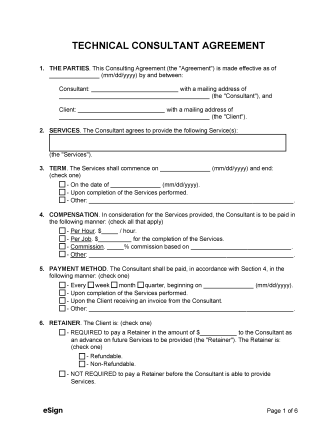

A technical consulting agreement is a contract between a company and a technical expert hired to advise and propose technological solutions. The document acts as a record of the consultant’s terms and holds the parties accountable to their obligations as contractor and client. Included in the agreement will be both parties’ identities and addresses, the scope and duration of the contract, the amount of compensation, the conditions of payment , and a clear description of the consultant’s services.
A technical consultant provides companies with information technology (IT) support services to help problem solve and optimize operations . To operate successfully as a consultant, individuals will need a deep understanding of network administration, hardware and software-based solutions, and IT systems . Technical consultants may work in-house with a particular client on an ongoing basis or freelance as a consultant to various businesses on a project-by-project basis.
Development Technical Consultant – Works to solve technical issues in the development of software or hardware.
Engineering Technical Consultant – Proposes technical solutions to a company’s obstacles and needs.
Hardware/Software Design Technical Consultant – Assists an engineering team or operates independently to design a product.
Process Technical Consultant – Audits an organization and provides technical solutions that improve their manufacturing operations.
Technical Training Consultant – Trains end-users on how to use software programs or system hardware.
Although many roles may overlap under the title of “technical consultant,” it is generally understood that technical and functional consultants are two separate, but complementary, roles.
The job of a functional consultant is to assess the client’s needs and translate those requirements into a functional solution with specifications (“specs”) for the development of a software solution. To work in this field, an individual must be proficient in customer relationship management (CRM) systems.
A technical consultant uses the functional consultant’s specifications to develop technical specs, and upon client approval, does the coding for the software-based solution. Technical consultants need to be fluent in advanced business application programming (ABAP) and JavaScript.
The below steps outline the general education and career requirements for a technical consultant.
To maintain a successful career, the consultant will need to stay up-to-date with tech and work trends to develop a professional network from which to draw new contracts. Although a college or university degree is almost always required to work as a technical consultant, exceptions are sometimes made if the candidate is an extremely skilled programmer.